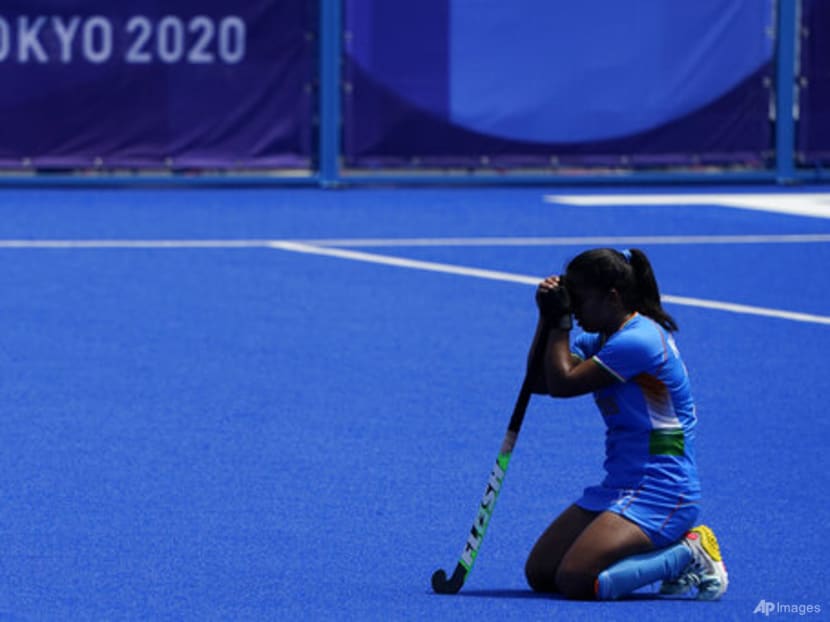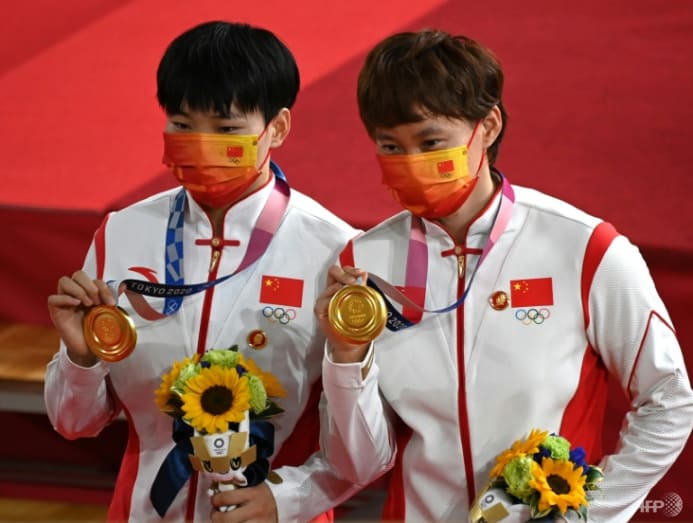Commentary: The Olympic-sized difference between India and China
Advertisement
Commentary
Commentary: The Olympic-sized difference between India and China
Whereas India produces individual excellence despite the system'due south limitations, individual success in China is a product of the arrangement, says Shashi Tharoor.

Bharat's Neha Goyal kneels on the pitch after her side lost the Tokyo Olympics women's field hockey bronze medal lucifer 4-3 to Keen U.k. on Aug half-dozen, 2021. (File photo: AP/John Minchillo)
06 Sep 2022 06:10AM (Updated: 06 Sep 2022 06:10AM)
NEW DELHI: The Tokyo Olympic Games are over , and the Japanese people and authorities take heaved a sigh of relief that the spectacle passed without a major COVID-19 outbreak in the athletes' village or other disasters.
Here in India, the celebrations of the land'south first gold medal in the men's javelin throw – and its best-e'er medal performance at a single Olympics – take non yet subsided. But how skillful, actually, is its best?
A decade or and then ago, many spoke of Bharat and China in the same breath. The two countries were supposedly the new contenders for global eminence afterward centuries of Western ascendancy.
Some fifty-fifty spoke of "Chindia", as if they were joined at the hip in the international imagination.
But anyone seeking confirmation that such twinning is, to put information technology mildly, out of place, need only look at the medal tally in Tokyo.
China ranked a proud second, with 38 gold medals – one fewer than the United states of america – and 88 medals in total.
Now scroll downwards, past Belarus, divided Georgia, the Commonwealth of the bahamas and even the breakaway province of Kosovo (whose independence Republic of india does not recognise).
There, in 48th identify, sits India, with seven medals in all, one gold, two silver, and four bronze.

NO SURPRISE
In fact, this is not a surprise. Whereas China has systematically strived for Olympic success since it re-entered global athletic competition after years of isolation, Republic of india has remained complacent about its lack of sporting prowess.
Prc lobbied for and won the right to host the Summertime Olympics barely 2 decades after its render to the Games. But Bharat rested on its laurels afterwards hosting the 1982 Asian Games in Delhi and is now seen as beingness farther behind in the contest to host the Olympics than it was 4 decades ago.
In the run-up to the 2008 Beijing Games, China embarked on Projection 119, a regime plan devised specifically to boost the state's Olympic medal booty (the 119 refers to the number of golds awarded at the 2000 Sydney Games in such medal-laden sports equally track and field, swimming, rowing, sailing, and boating and kayaking).
Indians, by contrast, wonder if they will ever crack the magic ceiling of ten medals.
China, seeing the number of medals on offer in kayaking, decided to create a squad that would master a sport hitherto unknown in the Heart Kingdom.
But India has not fifty-fifty lobbied successfully for the inclusion in the Games of the few sports it does play well, such as kabaddi (a form of tag-team wrestling), polo or cricket, which was played in the 1900 Olympics and never since.
Likewise, Red china has developed new strengths in other non-traditional sports, like shooting, while maintaining its potency in table tennis and badminton.
India, past contrast, has seen its once-legendary invincibility in field hockey fade with the introduction of bogus turf, to the point where a statuary for the men's squad in Tokyo prompted great exhilaration.
What was competing at a postponed, pandemic Olympics like? Swimmer Quah Ting Wen and rower Joan Poh share their experiences on CNA'southward podcast, Middle of the Matter:
When information technology comes to sport, forget "Chindia" – the two countries barely belong in the same sentence.
MILITARY Discipline VS SHAMBOLIC ORGANISATION
What has happened at the Olympics speaks to a basic divergence in the two countries' systems. Put metaphorically, it'southward the artistic chaos of all-singing, all-dancing Bollywood versus the perfectly choreographed precision of the 2008 Beijing opening ceremony.
The Chinese approached the task of dominating the Olympics with acme-downwards armed services bailiwick. The objective was established, a plan to accomplish it drawn upward, the state'due south considerable resources devoted to it, state-of-the-art applied science caused and world-class coaches imported.
Republic of india, past contrast, approached the Tokyo Olympics equally information technology had every other, with its usual combination of affable amateurism, bureaucratic ineptitude, half-hearted experimentation, and shambolic organization.
That's simply the way we are. If the Chinese regime want to build a new half dozen-lane motorway, they tin drive their manner past any number of villages in its path.
But if yous want to widen a two-lane road in Republic of india, you could be tied upwards in courtroom for a dozen years fighting over compensation claims.
In China, national priorities are established by the regime then funded by the state; in Republic of india, they emerge from seemingly endless discussions and arguments amongst myriad interests, and funds accept to be found where they tin can.
China'southward budget for preparing its athletes for the Tokyo Games solitary probably exceeded Bharat's expenditure on all Olympic preparation in the last seventy years.
So, whereas India produces private excellence despite the organization's limitations, individual success in China is a product of the organization.
A FRACTIOUS DEMOCRACY
Indians excel wherever individual talent is given free rein. The country has produced due westorld-class computer scientists, mathematicians, biotech researchers, filmmakers and novelists.
Simply come up up with a challenge that requires high levels of organisation, strict discipline, sophisticated equipment, systematic training and rubberband budgets, and Indians quail.
Perhaps tellingly, the only Indians who have attained the title of world champion in recent years have been a billiards role player and a chess grandmaster.
In Tokyo, the much-favoured Indian shooters failed to win a single medal, owing to setbacks such every bit a malfunctioning trigger on a world champion'due south pistol that could not exist stock-still chop-chop enough.
The best women'south table tennis player, denied the advice of her trainer, snubbed the official Indian coach, leading to disciplinary action. Our female archer, ranked starting time in the world, failed to become past her qualifying circular.
Republic of india's sporting talent pool is smaller than its large population suggests; in a state of existential challenges and intense contest for every opportunity, very few feel able or inclined to devote the time needed to principal a sport.
The system is not designed to unearth athletic talent, and many who have it lack the health, diet, sporting infrastructure and training resource required to brand a global mark.
Republic of india, unlike China, is a fractious commonwealth. People's republic of china will win many Olympic medals for many Games to come up. Merely India, perchance, might win some hearts.
Shashi Tharoor, a former UN under-secretary-full general and old Indian Minister of State for External Affairs and Minister of State for Human Resource Development, is an MP for the Indian National Congress. PROJECT SYNDICATE
Recent Searches
Trending Topics
Source: https://cnalifestyle.channelnewsasia.com/commentary/china-india-tokyo-olympics-medal-neeraj-chopra-sport-295846

0 Response to "Commentary: The Olympic-sized difference between India and China"
Postar um comentário